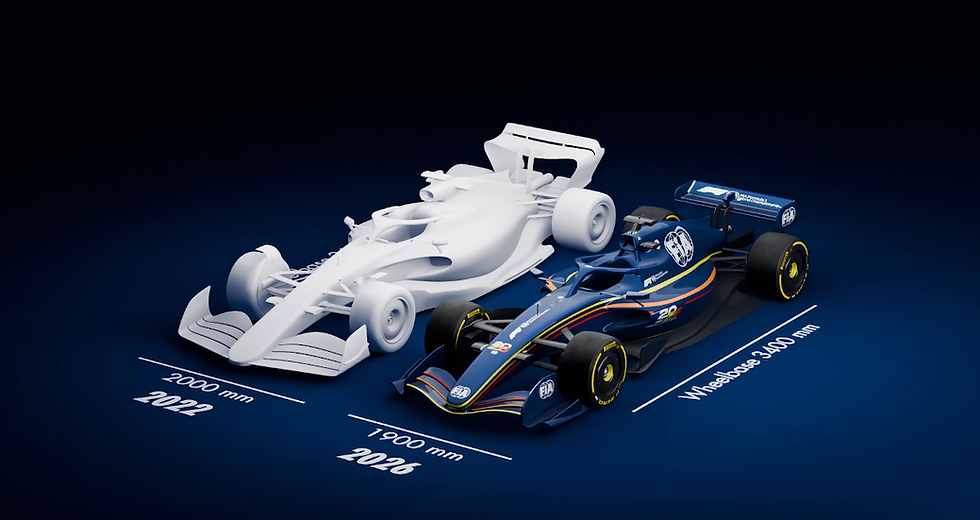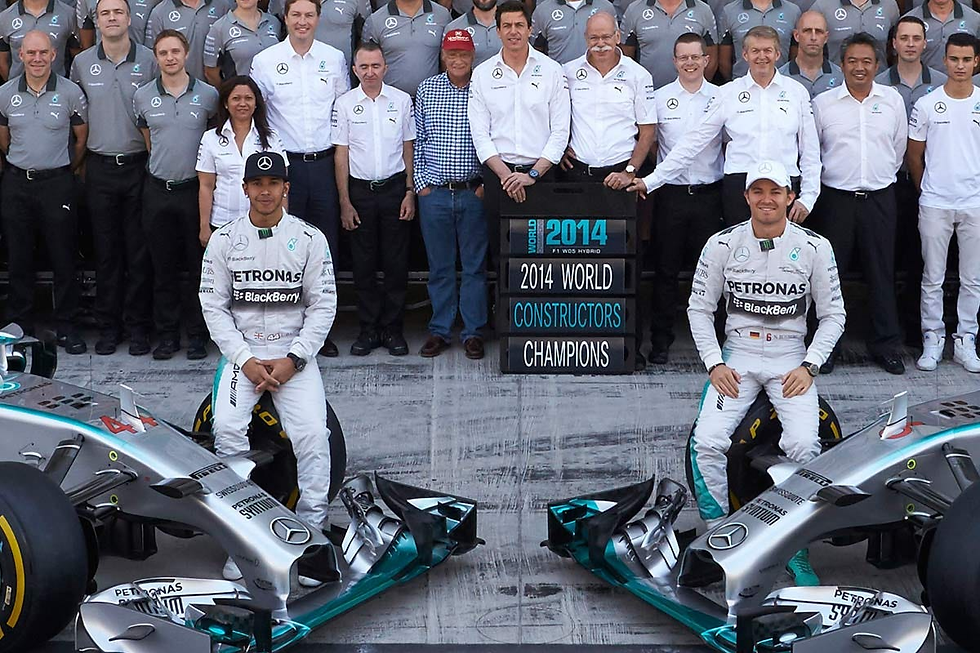Verstappen’s Final Verdict
- Dwayne Fernandes
- Aug 1, 2025
- 6 min read
In the off‑season crescendo of speculation and uncertainty, the saga surrounding Max Verstappen’s future has reached its denouement. While speculation had reached fever pitch, fanned by Mercedes interest and performance clauses in his contract, Friday’s confirmation confirms: Verstappen will remain with Red Bull Racing for the 2026 campaign.

The Exit Clause That Never Was
Verstappen’s deal with Red Bull extends until the end of 2028 and included an annual escape clause: he could leave if he sat fourth or lower in the drivers’ standings at the Hungarian Grand Prix just before the summer shutdown. His Belgian Grand Prix weekend delivered a sprint victory and sufficient points cushion to guarantee he would remain firmly within the top three, rendering the clause void for 2026.
Verstappen himself dispelled lingering doubts in Budapest: “It is time to stop all the rumours,” he stated, reaffirming his commitment to working on performance and car development rather than contract speculation.

What This Means for Red Bull
For new team principal Laurent Mekies, Verstappen’s confirmed retention removes a potentially destabilizing distraction entering the crucial phase of engine transition. Red Bull will become a power-unit manufacturer in 2026, pursuing its own engine architecture in partnership with Ford. Mekies highlighted that keeping Verstappen onboard hinges on delivering a fast car, ensuring the Dutchman has little incentive to consider other options.
Recent internal turbulence, including Christian Horner’s dismissal and technical shake‑ups, made this confirmation vital. Industry insiders suggest that clearing the exit-clause hurdle was key to preserving the team’s focus for the upcoming regulation overhaul.

The Mercedes and George Russell Factor
Verstappen's continuity reshapes the F1 driver-market dynamics. Mercedes have reportedly secured George Russell into a deal through at least 2027, solidifying him as their lead driver while keeping the door ajar for potential moves in 2027, when Verstappen could again be available if results falter.
That possibility raises strategic tension. Russell himself has expressed mixed feelings about uncertainty around his future and the lingering spectre of a Verstappen-to-Mercedes move.
Battle-tested rivals on track, Verstappen and Russell collided at the Spanish Grand Prix in a high-profile incident, earning Max a ten-second penalty. Mercedes accused Verstappen of excessively aggressive behaviour, while he defended it as frustration boiling over in a chaotic midfield fight.

The Bigger Picture: Stability, Power, and the Road to 2026
With Verstappen locked in and Mekies at the wheel, Red Bull enters a pivotal transitional period. The team’s ability to engineer a competitive 2026 car, not just for next year, but for longer-term dominance, will determine whether this renewal yields success or further attrition.
For Mercedes, consolidating its driver line-up around Russell (and rising Kimi Antonelli) aligns with stability, but also positions the team for a future window if Verstappen were ever to become available again. Meanwhile, rival teams like Aston Martin and newcomer Cadillac will watch the scenario closely.
Regulation changes and Red Bull’s engine development present both opportunity and danger. Verstappen remaining in the fold gives Red Bull one less distraction, but raises expectations exponentially.

Why 2026 Is All About Engines
Formula 1’s new regulation cycle, set to debut in 2026, marks a fundamental shift in car and engine philosophy. With sustainability as its headline goal, the rules will introduce 100% sustainable fuels and a vastly increased reliance on electric power, with nearly 50% of total deployment expected to be electric from the new hybrid power units.
What that means, in essence, is that power unit competitiveness will once again become the defining performance differentiator, just as it did at the start of the hybrid era in 2014. And right now, Mercedes appears to be ahead of the curve.
Insiders across the paddock have described Mercedes’ prototype power unit as “punchy” and “efficient,” with early dyno runs suggesting a substantial lead over Red Bull Powertrains-Ford and Ferrari. While Honda (powering Aston Martin) and Audi are still refining architecture, it’s Mercedes who seems to have timed their resurgence perfectly for the dawn of a new era.

Lessons from 2014–16: The Mercedes Blueprint
The new rules bear echoes of 2014’s hybrid-era reset, a seismic change that catapulted Mercedes into an era of unprecedented dominance. Their 2014–16 power unit was so far ahead that rival teams spent years playing catch-up, with reliability, deployment lag, and thermal efficiency proving to be monumental hurdles.
The paddock fears a similar imbalance for 2026. And Verstappen, with fresh scars from watching Red Bull stumble in technical transitions, especially in 2025, may already be mentally preparing for that contingency.
It’s also no coincidence that Verstappen and his advisors reportedly monitored Mercedes’ power unit development closely over the past 18 months. If Red Bull’s engine project doesn’t deliver parity from the start, 2026 could serve as a red flag season, not just for competitiveness, but for loyalty.

2027: The Escape Hatch Still Exists
Though Verstappen’s contract runs through 2028, Red Bull’s decision to include annual performance clauses offers him the ability to re-evaluate every year. Should Red Bull’s 2026 power unit underperform, or if the team’s structure remains unsettled post-Horner, 2027 becomes the next critical pivot point.
And Mercedes will almost certainly be watching.
With George Russell already locked in and Andrea Kimi Antonelli developing as a long-term prospect, Toto Wolff’s vision of a Verstappen-led resurgence hasn’t fully disappeared, it’s just been delayed. A disappointing 2026 campaign from Red Bull could reopen conversations for 2027, particularly if Verstappen grows frustrated with being in the wrong machinery during his prime years.
The Psychological Game: Verstappen's Patience Has Limits
Verstappen’s strength has always been his singular focus. But that comes with an expectation: to fight for wins, not just points. If Red Bull’s trajectory continues downward, it’s difficult to imagine Verstappen tolerating another multi-season rebuild, especially when Mercedes, Ferrari, and even Aston Martin could offer a clearer path to championship contention.
In the current environment, he’s staying. But it's not unconditional loyalty, it's conditional performance. 2026 must deliver not just progress, but competitiveness.
Red Bull Must Win Early in 2026
The blueprint is clear: the early races of 2026 will act as a litmus test for Red Bull’s entire long-term vision. A strong engine launch will solidify the Verstappen era into the new ruleset. A weak start? That may trigger a high-stakes reshuffle and revive Mercedes’ hopes of landing the most valuable driver in modern F1.
For now, the drama is paused. But with the technical reset looming and power unit supremacy up for grabs, the Verstappen–Red Bull partnership is entering its most delicate phase yet, stable, but still on a knife’s edge.

Life Beyond Formula 1? Verstappen’s Exit Strategy
While much of the focus has been on whether Max Verstappen might jump ship to another F1 team, the more intriguing, and perhaps more likely, long-term scenario is that he may choose to walk away from the sport altogether.
Verstappen has never hidden his distaste for the increasing showmanship and politicization of modern Formula 1. From his clashes with the FIA over sprint formats to his vocal criticism of how decisions are handled behind the scenes, the Dutchman has made it clear that he sees F1 drifting from its racing roots. “It’s becoming more about the entertainment than the actual sport,” he once remarked, a telling sentiment from someone known for his pure-racer mentality.
Beyond that, Verstappen has openly spoken about his desire to one day race in endurance or GT categories, a more relaxed environment that offers the thrill of driving without the relentless scrutiny of the F1 circus. His private GT testing stints, his own verstappen.com racing team and strong ties with sim racing teams hint at a future beyond single-seaters.
And then, of course, there’s his growing family. Now a father, Verstappen has repeatedly expressed the importance of being present for his daughter as she grows up, a priority that may eventually outweigh chasing statistical greatness. “I’m not here to win eight titles or chase records,” he’s said. “I want to enjoy what I’m doing and spend time with the people I care about.”
The bottom line? If Formula 1 continues down a path he no longer aligns with, whether competitively or culturally, Max Verstappen’s final exit may not be to Mercedes, but to something entirely different.
Summary?
With Max Verstappen now locked into Red Bull for the 2026 season, the immediate storm of speculation has calmed—but only temporarily. As F1 prepares for its radically engine-focused regulation reset, Red Bull’s performance next season will be critical in keeping Verstappen satisfied. Mercedes, with apparent power unit superiority, remains a looming alternative for 2027 should Red Bull stumble. Yet, Verstappen’s future might not lie within F1 at all. Disillusioned by the sport’s increasing theatrics and committed to spending more time with his family, the reigning champion has hinted at an early retirement or a switch to endurance racing. One thing is clear: the Verstappen era is far from stable, it’s just entered its next phase.





Comments